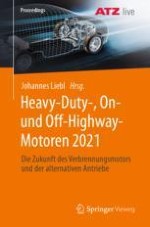2022 | OriginalPaper | Buchkapitel
Analysis and Optimisation of the Combustion Process on a Medium-Speed Dual-Fuel Single-Cylinder Research Engine Using Highly Fluctuating Fuel Gas Qualities
verfasst von : Karsten Schleef, Björn Henke, Sebastian Cepelak, Bert Buchholz, Martin Theile
Erschienen in: Heavy-Duty-, On- und Off-Highway-Motoren 2021
Verlag: Springer Fachmedien Wiesbaden
Aktivieren Sie unsere intelligente Suche, um passende Fachinhalte oder Patente zu finden.
Wählen Sie Textabschnitte aus um mit Künstlicher Intelligenz passenden Patente zu finden. powered by
Markieren Sie Textabschnitte, um KI-gestützt weitere passende Inhalte zu finden. powered by
